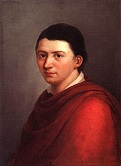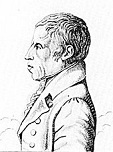











TLW's Linguistscope™ (Linguist Historyscope) |
By T.L. Winslow (TLW), the Historyscoper™ |
© Copyright by T.L. Winslow. All Rights Reserved. |
Original Pub. Date: June 22, 2017. Last Update: July 8, 2020. |



Westerners are not only known as history ignoramuses, but double dumbass history ignoramuses when it comes to linguistics and cunning, er, linguist history. Since I'm the one-and-only Historyscoper (tm), let me quickly bring you up to speed before you dive into my Master Historyscope.

On Jan. 15, 1784 Westminster, London-born Anglo-Welsh philologist Sir William Jones (1746-94), a supreme court judge in Ft. William, Bengal founds the Asiatic (Asiatick) Society to study Sanskrit and further research on Asia, going on to pub. the journal Asiatick Researches. On Feb. 2, 1786 he delivers a famous speech in Calcutta to the Asiatic Society, claiming a common source for the Sanskrit, Persian, Greek, Latin, Celtic, and German languages, with the soundbyte: "The Sanskrit language, whatever be its antiquity, is of a wonderful structure; more perfect than the Greek, more copious than the Latin, and more exquisitely refined than either, yet bearing to both of them a stronger affinity, both in the roots of verbs and the forms of grammar, than could possibly have been produced by accident; so strong indeed, that no philologer could examine them all three, without believing them to have sprung from a common source, which, perhaps, no longer exists; there is a similar reason, though not quite so forcible, for supposing that both the Gothic and the Celtic, though blended with a very different idiom, had the same origin with the Sanskrit; and the old Persian might be added to the same family."

In 1808 German philologist Karl Wilhelm Friedrich von Schlegel (1772-1829) pub. On the Speech and Wisdom of the Indians (Von der Sprache und Weisheit der Inder) in Heidelberg), backing up Sir William Jones (1786) on the etymological connection between Sanskrit, Greek, and Latin, turning on Greek academics to the study of Sanskrit, incl. Franz Bopp.

In 1816 German linguist Franz Bopp (1791-1867) pub. Über das Conjugationssystem der Sanskritsprache in Vergleichung mit jenem der griechischen, lateinischen, persischen und germanischen Sprache (On the Conjugation System of Sanskrit in comparison with that of Greek, Latin, Persian and Germanic), founding the science of Comparative Grammar. In 1833 he pub. Comparative Grammar of the Sanscrit, Zend, Greek, Latin, Lithuanian, Gothic, German, and Sclavonic Languages (Vergleichende Grammatik) (3 vols.) (1833-53), which postulates a lost "Indo-Germanic" proto-language - and keeps white supremacists dreaming of a White Christmas?

In 1821 French polyglot philologist Jean-Francois Champollion (1790-1832) (prof. of history at the Lyceum of Grenoble since age 19) finally cracks Egyptian hieroglyphics using the Rosetta Stone (discovered in 1799), and in 1824 is sent by Charles X to Italy to study Egyptian antiquities in their museums, after which in 1828 he goes to Egypt for more study.

In 1823 German linguist Julius Heinrich Klaproth (1783-1835) pub. Asia Polyglotta (Paris), containing all that is known about Oriental languages by Westerners at this point.

In 1827 German Prussian linguist Friedrich Wilhelm Christian Karl Ferdinand von Humboldt (1767-1835) pub. On the Dual, which shows that ancient languages such as Sanskrit are syntactically more complex than modern ones, ending attempts to find a common simpler original language.


The original Star Trek-Worf Hypothesis of intergalactic languages gets off to a slow start? In 1929 Prussian-born Am. linguist Edward Sapir (1884-1939) (student of Franz Boas) pub. the Sapir-Whorf Hypothesis, that languages constrain the way people think; in 1931 he hooks up with well-fixed linguistic dabbler Benjamin Lee Whorf (1897-1941), and they go on to develop the theory into a form that is slowly accepted by the academic community, boosted by the posth. pub. of Whorf's writings in 1956 - Russians can't say "I have", only "by me is", therefore they naturally go Commie? Brits have the "the/a" game to play with, therefore they naturally build a snooty class society? Americans think of time as something to "spend" or "save", hence they are always in a rush?

In 1955 Philly-born linguist Avram Noam Chomsky (1928-) pub. The Logical Structure of Linguistic Theory, which challenges structural linguistics and introduces transformational (generative) grammar, consisting of a context-free grammar with transformational rules, positing a Language Acquisition Device (LAD) and a Universal Grammar (UG). In 1957 he pub. Syntactic Structures, which claims that human language is "hard-wired", and that there are only superficial variations among languages, starting a rev. in linguistics and taking it out of the "verbal botany" mindset; "Colorless green ideas sleep furiously." In 1957 Am. behaviorist psychologist B.F. Skinner (1904-90) pub. Verbal Behavior, which claims that it is subject to the same controlling variables as other operant behavior; in 1959 Noam Chomsky pub. Review: Verbal Behavior by B.F. Skinner, helping launch the Cognitive Rev. in psychology, which tries to overturn Behaviorism. In May 1965 he pub. Aspects of the Theory of Syntax, his magnum opus on linguistics, presenting his epistemological assumptions with the goal of making linguistic theory-making a discipline on a par with the physical sciences, dissing behaviorism, constructivism, empiricism, and structuralism in favor of generativism, mentalism, nativism, and rationalism, focusing on the inner workings of the human mind during language acquisition and production - the kind of book everybody wishes they could write but don't have the innate capacity?